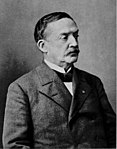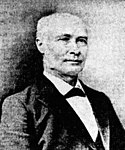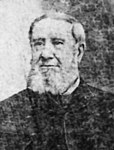| |||||||||||||||||||||
Statistics for the 79th and final vote, April 19, 1899 124 votes needed to win | |||||||||||||||||||||
|---|---|---|---|---|---|---|---|---|---|---|---|---|---|---|---|---|---|---|---|---|---|
| |||||||||||||||||||||
| |||||||||||||||||||||
An election for the United States Senate was held by the Pennsylvania General Assembly beginning on January 17, 1899, to fill the seat then held by Matthew Quay for a six-year term beginning March 4, 1899. Quay was a candidate for re-election, but he was damaged by a pending indictment for involvement in financial irregularities with state money; his trial took place during the three months that the legislature attempted to resolve the Senate deadlock, and he was acquitted the day it adjourned, having failed to elect a senator. Quay was appointed to the Senate seat by the governor, but the Senate refused to seat him on the grounds that the governor lacked the constitutional authority to make the selection, and the seat remained vacant until the next meeting of the legislature, in 1901, when Quay was elected.
Quay was Pennsylvania's Republican political boss, and had served two terms in the Senate. Dissident Republicans and reformers were determined to defeat him for a third term, and sought to elect candidates in the 1898 elections for the legislature. Prominent among the anti-Quay forces was Philadelphia businessman John Wanamaker, who had been defeated for the Republican nominations for senator in 1897 and governor in 1898 through Quay's influence. Wanamaker made speeches against Quay during the 1898 campaign, though he refused to seek the Senate seat himself.
Although Republicans had an ample majority in the legislature, enough were opposed to Quay to deny the senator the majority he needed for re-election. Democrats and anti-Quay Republicans refused to join together to elect another candidate, though they had a majority between them. Democrats supported their 1898 gubernatorial candidate, George A. Jenks, while the dissident Republicans voted for several candidates before settling on Benjamin F. Jones. The legislature voted once a day during the session of over three months; no compromise was reached, and the session ended on April 20 without the election of a senator.
After the session and Quay's acquittal, Governor William A. Stone appointed Quay to the vacancy, but the U.S. Senate refused to seat him by one vote, and the senatorship remained vacant until 1901. Quay blamed his fellow Republican political boss, Mark Hanna of Ohio, for the defeat in the Senate, and gained revenge at the 1900 Republican National Convention by supporting Thomas C. Platt's scheme to politically sideline Governor Theodore Roosevelt of New York by making him vice president, over Hanna's strong objection. After Quay's return to the Senate in 1901, he served there until his death in 1904, when control of Quay's political machine passed to his fellow Pennsylvania senator, Boies Penrose.
© MMXXIII Rich X Search. We shall prevail. All rights reserved. Rich X Search



